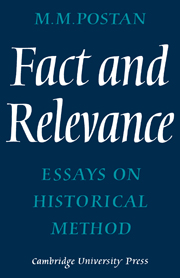Book contents
- Frontmatter
- Contents
- Acknowledgments
- Preface
- 1 Reason in social study
- 2 History and the social sciences
- 3 The historical method in social science
- 4 Function and dialectic in economic history
- 5 Fact and relevance in historical study
- 6 Economic and social history
- 7 Economic growth
- 8 A plague of economists?
- 9 The uses and abuses of economics
- 10 Agriculture and economic development: a lesson of history
- 11 Technological progress in post-war Europe
- 12 A study of history
- 13 Karl Marx: a democrat?
- 14 Hugh Gaitskell: political and intellectual progress
- Index
4 - Function and dialectic in economic history
Published online by Cambridge University Press: 07 October 2011
- Frontmatter
- Contents
- Acknowledgments
- Preface
- 1 Reason in social study
- 2 History and the social sciences
- 3 The historical method in social science
- 4 Function and dialectic in economic history
- 5 Fact and relevance in historical study
- 6 Economic and social history
- 7 Economic growth
- 8 A plague of economists?
- 9 The uses and abuses of economics
- 10 Agriculture and economic development: a lesson of history
- 11 Technological progress in post-war Europe
- 12 A study of history
- 13 Karl Marx: a democrat?
- 14 Hugh Gaitskell: political and intellectual progress
- Index
Summary
The topic of this essay, frequently discussed by initiates in private, has not so far been introduced to the main body of economic historians. My decision to assume the task of introducing it has been prompted by a personal encounter with the problem. Some time ago I showed to Dr N, a younger colleague in my field, something I had written about sales of land in the villages of the twelfth and thirteenth centuries. My argument was that the village land market and the social differences it caused were to be found in all the periods of the Middle Ages for which there is evidence. The conclusion aroused my colleague to a rueful comment that if I were right–and he appeared to think that I was–the outcome of my study, like that of other such studies, might be to create the impression that English society never changed; and where there was no change there was no history.
This is, of course, a real problem. Its reality may not seem apparent to the straight historians, i.e. those who mainly occupy themselves with political narrative and biography, and least of all to the large number of antiquaries among them. But it must occur to historians whose work is ‘problem-oriented’. They are mostly historians of society and culture, and they frequently share their interests with their next-door theoreticians–the sociologists, the economists, the philosophers. Where they differ from the theoreticians is in their reliance on the evidence of past changes.
- Type
- Chapter
- Information
- Fact and RelevanceEssays on Historical Method, pp. 35 - 47Publisher: Cambridge University PressPrint publication year: 1971



